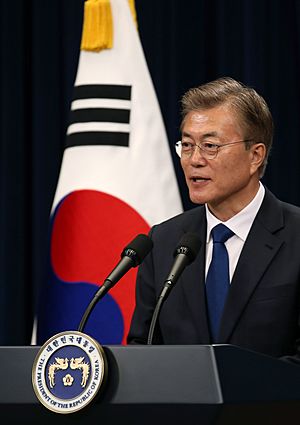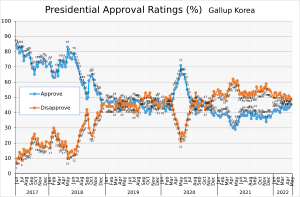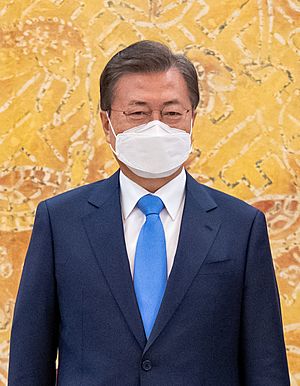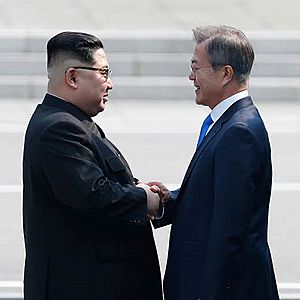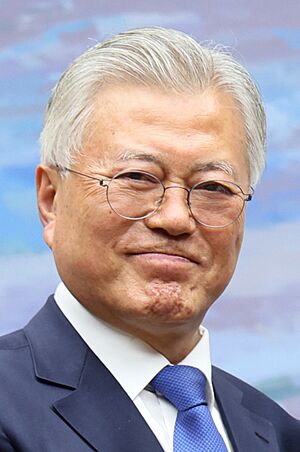Moon Jae-in facts for kids
Quick facts for kids
Moon Jae-in
GOM
|
|
|---|---|
|
문재인
|
|
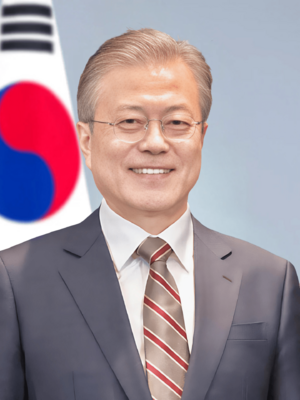
Moon in 2018
|
|
| 12th President of South Korea | |
| In office 10 May 2017 – 10 May 2022 |
|
| Prime Minister | Yoo Il-ho (acting) Lee Nak-yon Chung Sye-kyun Hong Nam-ki (acting) Kim Boo-kyum |
| Preceded by | Park Geun-hye Hwang Kyo-ahn (acting) |
| Succeeded by | Yoon Suk Yeol |
| 2nd Leader of the Democratic Party | |
| In office 9 February 2015 – 27 January 2016 |
|
| Preceded by | Moon Hee-sang (interim) |
| Succeeded by | Kim Chong-in (interim) |
| Member of the National Assembly | |
| In office 30 May 2012 – 29 May 2016 |
|
| Preceded by | Chang Je-won |
| Succeeded by | Chang Je-won |
| Constituency | Sasang (Busan) |
| Chief of Staff to the President | |
| In office 12 March 2007 – 25 February 2008 |
|
| President | Roh Moo-hyun |
| Preceded by | Lee Byung-wan |
| Succeeded by | Yu Woo-ik |
| Personal details | |
| Born | 24 January 1953 Geoje, South Korea |
| Political party | Democratic |
| Spouse |
Kim Jung-sook
(m. 1981) |
| Children | 2 |
| Parents | Moon Yong-hyung (father) Kang Han-ok (mother) |
| Alma mater | Kyung Hee University (LLB) |
| Occupation |
|
| Signature | |
| Website | |
| Military service | |
| Allegiance | South Korea |
| Branch/service | Republic of Korea Army |
| Years of service | 1975–1978 |
| Rank | Sergeant |
| Unit | Army Special Warfare Command |
| Battles/wars | Operation Paul Bunyan |
| Korean name | |
| Hangul |
문재인
|
| Hanja |
文在寅
|
| RR | Mun Jaein |
| MR | Mun Chaein |
| IPA | [mun.dʑɛ.in] |
Moon Jae-in (born January 24, 1953) is a South Korean politician and former lawyer. He served as the 12th president of South Korea from 2017 to 2022. Before becoming president, he worked as a senior secretary and chief of staff for President Roh Moo-hyun. He was also a member of the National Assembly and the leader of the Democratic Party of Korea.
Moon was born to North Korean refugees and grew up in poverty in Busan. He was a good student and studied law at Kyung Hee University. He became a lawyer and worked to protect human rights with Roh Moo-hyun. He was even put in prison for protesting against the Yushin Constitution. Because of his work in human rights law, Moon was chosen to help Roh's campaign in the 2002 presidential election. He held many important roles in Roh's government. In 2012, Moon ran for president but lost to Park Geun-hye.
In the 2017 presidential election, Moon was elected president. This happened after Park Geun-hye was removed from office. As president, Moon became well-known for meeting with North Korean Chairman Kim Jong Un several times in 2018. He was the third South Korean president to meet a North Korean leader. In 2019, he also met with Kim and US President Donald Trump at the Korean Demilitarized Zone (DMZ). During his time as president, Moon supported the Sunshine Policy, which aimed for peaceful relations with North Korea. He also worked to change large family-owned businesses called chaebols, increased the minimum wage, and shortened the workweek. Moon received praise for his handling of the COVID-19 pandemic in South Korea. His party won a big victory in the 2020 South Korean legislative election. However, his party lost the next presidential election. Moon left office in May 2022, and Yoon Suk Yeol became the new president.
Contents
- Early Life and Education
- Early Career as a Lawyer
- Political Journey Before Presidency
- 2017 Presidential Election
- Presidency (2017–2022)
- After the Presidency (2022–present)
- Legacy and Impact
- Electoral History
- Awards and Recognition
- Personal Life
- See also
Early Life and Education
Moon Jae-in was born in Geoje, South Korea, on January 24, 1953. This was shortly before the end of the Korean War. He was the second child and oldest son of five children. His parents were refugees from North Korea who fled during the Korean War.
His family later settled in Busan. Moon's family was very poor. His father tried to sell socks, but it led to debt. His mother became the main provider by selling clothes and delivering coal briquettes. Moon's family became involved with the Catholic Church because his mother went there for milk powder. Moon once said he didn't know how to ride a bike because his family couldn't afford one or even school tuition.
Moon attended Kyungnam High School and was a top student. He received a full scholarship to study law at Kyung Hee University. There, he met his future wife, Kim Jung-sook. He was arrested and expelled from the university for organizing a student protest against the Yushin Constitution. Later, he joined the military and served in the Special Forces. He took part in "Operation Paul Bunyan" during the axe murder incident in Panmunjom.
After leaving the military, Moon studied for the bar exam because his father had passed away. He passed the first part of the exam in 1979. In 1980, he finished his studies at Kyung Hee University and passed the second part of the bar exam. He graduated from the Judicial Research and Training Institute as the second-best student. However, he could not become a judge or prosecutor because of his past student activism. So, Moon decided to become a private lawyer.
Early Career as a Lawyer
Human Rights Work
After becoming a lawyer, Moon worked with future president Roh Moo-hyun in the 1980s. Together, they handled cases about workers' rights and became known for their human rights work. As a member of the Busan Bar Association, Moon investigated a child labor camp called the Brothers Home.
He also helped start a progressive South Korean newspaper, The Hankyoreh, in 1988.
Working with President Roh Moo-hyun
Moon became Roh's campaign manager for his presidential election. After Roh won, Moon became a close helper, holding various roles in the presidential administration. He served as Senior Presidential Secretary for Civil Affairs, Senior Presidential Secretary for Civil Society, and Chief Presidential Secretary from 2003 to 2008.
When the National Assembly voted to remove Roh from office in 2004, Moon led the legal team that defended Roh. They won the case at the Constitutional Court. Moon also helped prepare for the second meeting between North and South Korea, but he did not attend it himself.
Political Journey Before Presidency
Entering Politics
Even though he wasn't interested in politics at first, Moon started to get involved. He wrote a book called Moon Jae-in: The Destiny, which became very popular. His popularity grew steadily, especially compared to his likely opponent, Park Geun-hye. In 2012, polls showed Moon was as popular as Park.
Moon gained support as people became less happy with conservative politicians due to corruption scandals. People saw Moon as a calm and sensible leader supported by younger generations.
2012 Elections
In 2012, Moon ran for a seat in the National Assembly. He won a seat in the Sasang District of Busan on April 11, 2012, as a member of the Democratic United Party. He received 55% of the votes.
On September 16, 2012, Moon was chosen as the presidential candidate for the Democratic United Party. He ran in the 2012 South Korean presidential election against Park Geun-hye and independent candidate Ahn Cheol-soo. Ahn later dropped out and supported Moon. However, Moon lost the election to Park Geun-hye.
Leading the Democratic Party
Moon was elected as the leader of the New Politics Alliance for Democracy (NPAD) on February 2, 2015. Before this, Moon and Ahn Cheol-soo, who was also a presidential candidate in 2012, had disagreements about the party's direction.
Ahn Cheol-soo left the party and formed the People's Party. Moon's new role as party leader led to the NPAD being renamed the new Democratic Party.
During his leadership, Moon brought many important people into the party. These included experts like Pyo Chang-won and Lee Chul-hee. He also recruited Cho Ung-chun, a former secretary to President Park. Moon did this to prepare for the 2016 legislative elections. After recruiting these people, Moon stepped down from his leadership position.
2017 Presidential Election
Campaign and Victory
Moon was seen as the favorite to win the 2017 South Korean presidential election. This election was held early in May 2017 because Park Geun-hye was removed from office. The Constitution required an election within 60 days.
Moon won the Democratic Party's nomination with 57% of the votes. He competed against other party members like Ahn Hee-jung and Lee Jae-myung.
In the general election, Moon faced four other main candidates, including Ahn Cheol-soo and Hong Jun-pyo. On May 10, 2017, Moon won the election with 41.1% of the votes. Because it was a special election, he became the 19th president of South Korea and was sworn into office the day after winning. There was no long transition period like in other elections.
Campaign Ideas for South Korea
Economy
Moon promised to spend 10 trillion won (about $8.9 billion) to create jobs and support new businesses and small companies. He aimed to create 810,000 public sector jobs by raising taxes on wealthy people.
Moon also wanted to fight corruption in large Korean companies called chaebols. He planned to give smaller shareholders more power in choosing company leaders.
Government Transparency
Moon promised to make his presidency more open. He planned to move the presidential residence from the large and isolated Blue House to a government building in downtown Seoul.
Social Issues
Moon faced criticism for comments he made about homosexuality during a televised debate. He said he opposed homosexuality in some forms. This caused anger among gay rights activists, especially since he was a liberal candidate and former human rights lawyer. Moon later clarified that he believes there should be no discrimination based on sexual orientation, but he still opposed legalizing same-sex marriage.
Campaign Ideas for Foreign Policy
Moon supported a peaceful reunification between North and South Korea. He said that if elected, his first visit would be to North Korea, similar to Roh Moo-hyun's visit in 2007. Moon's foreign policy towards North Korea was similar to the Sunshine Policy of former presidents Kim Dae-jung and Roh Moo-hyun.
His 2017 campaign also supported reopening the Kaesong industrial park.
Moon's views on foreign policy were quite open. He once said, "I'm pro-U.S., but now South Korea should be able to discuss a U.S. request and say no." He wanted South Korea to lead discussions about issues on the Korean Peninsula. At the same time, Moon saw America as a "friend" for helping South Korea avoid communism and grow its economy.
Presidency (2017–2022)
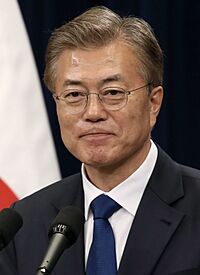 |
|
|
Presidency of Moon Jae-in
|
|
|---|---|
| May 10, 2017 – May 10, 2022 | |
| Premier | Yoo Il-ho (acting) Lee Nak-yon Chung Sye-kyun Hong Nam-ki (acting) Kim Boo-kyum |
| Cabinet | Full list |
| Party | Democratic |
| Election | 2017 |
| Seat | Seoul |
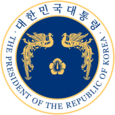 |
|
Moon became president on May 10, 2017, taking over from Acting President Hwang Kyo-ahn. He served a single five-year term, ending in 2022.
Moon's government was often described as liberal by the media. In August 2019, large protests happened in Seoul, with some people calling for Moon's removal from office. More protests took place in October.
Policies in South Korea
Business Reform
South Korea's economy has grown a lot thanks to Chaebols, which are large family-owned companies like Samsung and Hyundai. These companies have a lot of power and connections with the government. Moon appointed Kim Sang-jo, an activist known for challenging chaebols, to help reform them.
Technology Rules
As president, Moon signed a law called the "Anti-Google Law." This law stops companies like Apple and Google from forcing app developers to use only their payment systems. This means app developers can now use other ways for customers to pay, avoiding fees from Apple or Google.
Healthcare
Moon's healthcare policy aimed to expand coverage under the National Health Insurance.
Justice System Changes
Moon's administration worked to change the justice system, especially the power of prosecutors. Before, prosecutors had a lot of power to both investigate and accuse people. The goal was to reduce this concentrated power.
This reform was started by former Ministers of Justice like Cho Guk and Choo Mi-ae. Yoon Suk Yeol, who later became president, was also involved as a former Prosecutor General. As part of this process, a new office was created to investigate high-ranking officials. Some prosecutors resigned to show their disagreement with these changes.
The power of prosecutors did become weaker during Moon's presidency. However, some parts of the reform were changed because the opposition party disagreed.
Minimum Wage and Work Hours
Moon's government increased the minimum wage several times. In 2018, it went up by 16.4%. A report by Oxfam in 2018 said South Korea was one of the few countries in Asia trying to reduce inequality that year.
The maximum workweek was also reduced from 68 to 52 hours. A study in 2018 found that people in central Seoul spent less time at work and more time on leisure activities. However, bars and restaurants in central Seoul reported losing business.
Education Changes
Moon reversed his predecessor Park Geun-hye's plan to require state-issued history textbooks. Park had wanted to use government-created textbooks to promote patriotism. Critics believed this was a way to hide the negative parts of her father's rule. Moon's action meant schools continued to use privately published, government-approved textbooks.
Animal Rights
During his campaign, Moon promised to adopt a dog from an animal shelter. This was important because South Korea allows dog meat consumption. He adopted Tory, a black mixed-breed dog saved from a dog meat farm. This action was seen as a strong message against the dog meat trade.
Energy Policy
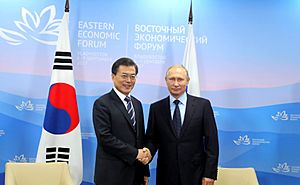
Moon's government aimed to increase South Korea's use of natural gas and move away from nuclear and coal energy. This included delaying new nuclear reactor construction and discussing a natural gas pipeline from Russia through North Korea. Moon stated that Korea would "exit the era of nuclear energy" by canceling new plants and not renewing licenses for old ones. He also shut down eight coal-fired power plants and planned to close ten more by the end of his term. He hoped renewable energy would meet Korea's needs in the future, using liquefied natural gas (LNG) as a temporary solution.
COVID-19 Pandemic Response
Moon's handling of the COVID-19 pandemic received praise both in South Korea and internationally. In early 2020, daily cases dropped significantly.
However, some South Koreans signed a petition to remove Moon from office, claiming his government mishandled the outbreak. In response, many others signed a petition supporting Moon's actions. Polls in March 2020 showed that many people approved of his government's response. James Kim, Chairman of the American Chamber of Commerce in Korea, praised Korea's proactive and transparent approach. Dr. Matt McCarthy from New York City also praised South Korea's aggressive testing efforts, which led to a low death rate.
In 2020, despite a rise in cases, thousands protested against Moon's policies in Seoul. Police investigated participants for violating COVID-19 rules.
LGBT Rights
Moon opposed same-sex marriage. In a 2017 debate, he said he opposed homosexuality in some forms. Later, he clarified that he believes sexual minorities should not face social persecution or discrimination, but a national agreement is needed for same-sex marriage.
In July 2020, a proposal for South Korea's first comprehensive anti-discrimination law, which would protect the LGBTQ community, did not receive open support from Moon. However, in December 2020, Moon emphasized the need for an Equality Act. Human Rights Watch urged Moon to protect the rights of the LGBTQ community.
2020 Legislative Election and Reforms
Moon's Democratic Party won a large majority in the 2020 South Korean legislative election, gaining 180 out of 300 seats. This was the biggest majority for any party since democracy returned in 1987. This allowed them to quickly pass new laws.
With this majority, the Democratic Party made several changes in December 2020:
- The National Intelligence Service (NIS) lost its role in domestic intelligence, with these powers going to the National Police Agency.
- New rules were made to punish those who spread false information about the 1980 Gwangju Uprising.
- Sending flyers to North Korea by balloons near the border became illegal.
- The maximum workweek was set to 52 hours, including overtime.
- Temporary workers received guaranteed paid parental leave.
- More workers could join unions, and collective bargaining agreements could last longer.
- The Truth and Reconciliation Commission was restarted.
- A new Corruption Investigation Office for High-ranking Officials was created, and the opposition party lost its right to block appointments for its head.
- Local police forces were established, allowing cities and provinces to have their own police.
- A new National Bureau of Investigation was created, separate from the National Police Agency.
Foreign Relations
International Visits
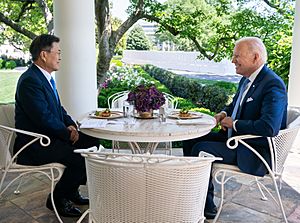
Moon visited the United States in June 2017 to meet with U.S. President Donald Trump. They discussed trade relations and North Korea's missile programs. Moon announced that President Trump accepted an invitation to visit South Korea.
North Korea Relations
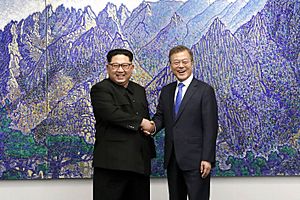
In a speech in Berlin in July 2017, Moon described the path to unification with North Korea as a long-term goal. He stressed the importance of the alliance with the United States and the need for North Korea to give up its nuclear weapons. He also hoped to work with other countries on unification. Moon supported sanctions against North Korea but was open to removing them if a peace treaty was established in exchange for denuclearization.
Moon initially opposed the full deployment of Terminal High Altitude Area Defense (THAAD) missile systems. However, after North Korea's missile launches, Moon asked the U.S. for permission to strengthen South Korea's defenses and temporarily set up a full THAAD system.
Moon met with Kim Jong Un on April 27, 2018. This meeting created a lot of excitement in South Korea, and Moon's popularity rose to 68%. Kim and Moon met again on May 26, 2018, at the DMZ, this time on the North Korean side. This meeting was not announced beforehand and focused on the cancelled summit with Donald Trump.
In September 2018, Moon Jae-in visited Pyongyang for another meeting. He and 150 delegates, including business and cultural leaders, met with Kim Jong Un. The two leaders agreed to reduce tensions at the DMZ, work on joint economic projects, and allow international experts to visit North Korean weapons sites. They also spoke to 150,000 North Koreans about unification and peace. Moon also climbed Mount Paektu with Kim, which was a dream for him. Moon was sometimes called "Kim Jong Un's Top Spokesman." In October 2018, Moon visited Europe to promote reconciliation with North Korea.
In March 2019, a U.N. panel accused South Korea of breaking sanctions by not telling the Security Council about its deliveries of petroleum products to a joint office. A U.S. Treasury document also listed a South Korean ship as possibly involved in transfers with North Korean tankers.
In January 2020, Moon was still focused on cooperation with North Korea. However, on June 16, North Korea blew up an inter-Korean joint liaison office. In September, Moon spoke at the United Nations General Assembly, expressing hope for an "end-of-war declaration" to bring peace to the Korean Peninsula.
Unemployment Trends
In January 2019, South Korea's unemployment rate reached 4.5%, the highest for that month since 2010. Youth unemployment, for Koreans aged 25-34, was the highest in 19 years. Some experts suggested that Moon's pro-labor policies, like raising the minimum wage and reducing work hours, might have contributed to the job challenges.
In November 2018, Moon replaced his finance minister and chief of staff for policy. This change aimed to bring new economic ideas to help the country move away from its manufacturing focus. By December 2021, the unemployment rate had dropped to 3.7%, which was the lowest since 2017 and similar to rates from the past two decades.
After the Presidency (2022–present)
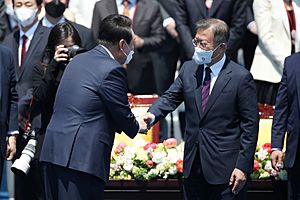
Moon left office on May 9, 2022. His successor, Yoon Suk Yeol, was sworn in the next day. Moon was the last president to use the Blue House as the official presidential office and home. Yoon moved the presidential office to a different building in Seoul. Moon now lives in Pyeongsan Village in Yangsan, South Gyeongsang Province.
In May 2024, Moon published a book called From the Periphery to the Center. The book brought up discussions about some events during his presidency.
After President Yoon Suk Yeol declared martial law on December 3, 2024, Moon posted on X: "I hope that the National Assembly will act quickly to protect our democracy from crumbling." He also urged the military not to get involved in a non-emergency martial law declaration or stop the National Assembly's vote to lift it.
In a February 2025 interview, Moon said he regretted appointing Yoon as Prosecutor General. He felt that Yoon used disagreements with Moon's government to enter politics and win the presidency. Moon had planned to protest the martial law in Seoul before the National Assembly overturned it. Moon called his successor "completely unfit for the presidency." On February 14, 2025, a newspaper revealed that a former military intelligence leader's notebook contained plans to arrest Moon and other public figures.
Legacy and Impact
Moon left office as one of the most popular presidents since free elections began in 1987. However, despite his high approval ratings, his party lost power after only five years. This was the first time this happened since South Korea became a democracy in 1987. Some believe his high approval ratings were due to public relations efforts and avoiding difficult issues.
Polls showed that during and after the COVID-19 pandemic, people's trust in the government increased. The government's response to the pandemic was seen as more effective than to past disasters. Moon's government reduced the maximum workweek, which improved work-life balance. It also expanded childcare benefits and healthcare coverage.
However, Moon's government did not pass a new anti-discrimination law, even with a majority in the National Assembly. It also struggled to solve a housing crisis in the Seoul area. This housing crisis was thought to have influenced the 2022 South Korean presidential election. Critics also argued that the rapid increase in the minimum wage negatively affected self-employed people. Moon expressed some regret about this impact.
In foreign policy, Moon is remembered for increasing South Korea's importance in international affairs. He pushed for trade deals with Southeast Asia and India through his New Southern Policy. This policy aimed to diversify South Korea's relationships due to growing competition between the U.S. and China. However, Moon's meetings with North Korea did not lead to major breakthroughs. Also, relations between South Korea and Japan became worse.
In 2017, Moon apologized to Vietnam for actions by South Korean troops during the Vietnam War. However, this issue was not widely discussed in Vietnamese or South Korean media as it was not seen as an official apology.
Electoral History
| Party | Candidate | Votes | % | |
|---|---|---|---|---|
| Democratic United | Moon Jae-in | 65,336 | 55.0 | |
| Saenuri | Son Su-jo | 51,936 | 43.7 | |
| Total votes | 208,214 | 100.0 | ||
| Democratic United gain from Saenuri | ||||
| Party | Candidate | Votes | % | |
|---|---|---|---|---|
| Saenuri | Park Geun-hye | 15,773,128 | 51.6 | |
| Democratic United | Moon Jae-in | 14,692,632 | 48.0 | |
| Total votes | 30,721,459 | 100.0 | ||
| Party | Candidate | Votes | % | |
|---|---|---|---|---|
| Democratic Party (South Korea, 2015) | Moon Jae-in | 936,419 | 57.0 | |
| Democratic Party (South Korea, 2015) | Ahn Hee-jung | 353,631 | 21.5 | |
| Democratic Party (South Korea, 2015) | Lee Jae-myung | 347,647 | 21.2 | |
| Democratic Party (South Korea, 2015) | Choi Sung | 4,943 | 0.3 | |
| Total votes | 1,642,677 | 100.0 | ||
| Party | Candidate | Votes | % | |
|---|---|---|---|---|
| Democratic Party (South Korea, 2015) | Moon Jae-in | 13,423,800 | 41.1 | |
| Liberty Korea | Hong Jun-pyo | 7,852,849 | 24.0 | |
| People Party (South Korea, 2016) | Ahn Cheol-soo | 6,998,342 | 21.4 | |
| Bareun | Yoo Seong-min | 2,208,771 | 6.7 | |
| Justice | Sim Sang-jung | 2,017,458 | 6.1 | |
| Total votes | 32,807,908 | 100.0 | ||
Awards and Recognition
National Awards
 South Korea: Received the Grand Order of Mugunghwa (May 3, 2022)
South Korea: Received the Grand Order of Mugunghwa (May 3, 2022)
International Awards
 Austria: Grand Star of the Decoration of Honour for Services to the Republic of Austria (June 14, 2021)
Austria: Grand Star of the Decoration of Honour for Services to the Republic of Austria (June 14, 2021) Colombia: Grand Collar of the Order of Boyaca (August 25, 2021)
Colombia: Grand Collar of the Order of Boyaca (August 25, 2021) Norway: Grand Cross of the Order of Saint Olav (June 12, 2019)
Norway: Grand Cross of the Order of Saint Olav (June 12, 2019) Slovenia: Member of the Order for Exceptional Merits (September 21, 2021)
Slovenia: Member of the Order for Exceptional Merits (September 21, 2021) Spain: Knight of the Collar of the Order of Civil Merit (June 8, 2021)
Spain: Knight of the Collar of the Order of Civil Merit (June 8, 2021) Sweden: Knight of the Royal Order of the Seraphim (June 14, 2019)
Sweden: Knight of the Royal Order of the Seraphim (June 14, 2019)
Other Recognitions
- Atlantic Council: Global Citizen Awards (September 19, 2017)
 IOC:
IOC:  Gold Olympic Order (August 30, 2018)
Gold Olympic Order (August 30, 2018)- Time: One of the 100 Most Influential People of 2018
Personal Life
Family and Pets
Moon married Kim Jung-sook, who was a vocalist at Kyung Hee University where he also studied. They both shared that they met when Moon was a student activist protesting the Yushin Constitution.
He has two children, a daughter and a son named Moon Joon Yong, who is a media artist.
Before becoming president in 2017, Moon and his wife lived with several dogs and cats that had been abandoned. Among them, a Pungsan dog named Maru and a cat named Jjingjjing lived with them at the Blue House. Jjingjjing was the country's first "First Cat."
After moving into the Blue House, they adopted a mixed-breed dog named Tory from an animal shelter. This was a notable choice because "First Dogs" had traditionally been purebred Jindo dogs. Moon said he wanted to show care for abandoned animals and remove the negative ideas about Tory's dark fur, which made him hard to adopt for two years. He also received two Pungsan dogs, Songgang and Gomi, as a gift from North Korean leader Kim Jong Un in September 2018. Gomi later gave birth to six puppies, named after parts of nature. These puppies were sent to different cities in South Korea in August 2019, while their parents stayed at the Blue House.
Religion
Moon is the third Korean president who is Catholic. His wife, First Lady Kim Jung-sook, is also Catholic. Moon is the second president to actively practice Catholicism while in office; his baptismal name is Timothy.
Nickname
His nickname is "Dark King," after a character from the Japanese manga series One Piece.
See also
 In Spanish: Moon Jae-in para niños
In Spanish: Moon Jae-in para niños
- Outline of South Korea
 | Georgia Louise Harris Brown |
 | Julian Abele |
 | Norma Merrick Sklarek |
 | William Sidney Pittman |


